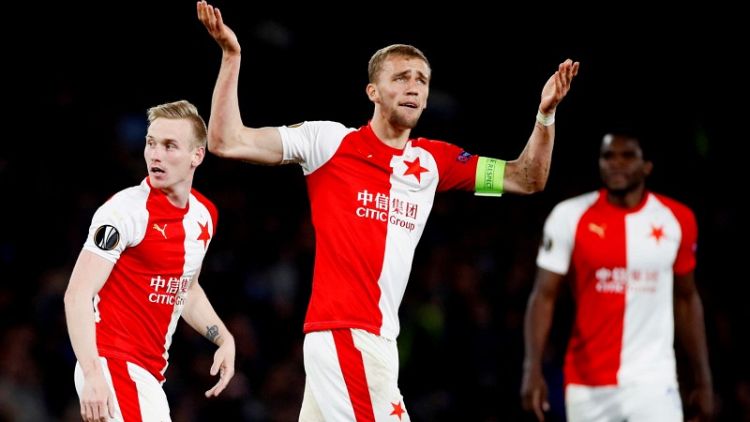By Robert Muller
PRAGUE (Reuters) - Fresh off a surprise quarter-final run in the Europa League and flush with cash from their Chinese owner, Slavia Prague are confident they can do what few clubs from the region have done before - play regularly in the Champions League group stage.
The oldest Czech soccer club – established in 1892 and now majority-owned by Chinese construction company Sinobo -- want to build on their showing this season by diving into the transfer market both at home and abroad to compete with teams across Europe.
Clubs from Eastern Europe have rarely made it through to the latter stages of the Champions League - with Romania's Steaua Bucharest (1986) and Serbia's Red Star Belgrade (in 1991 while still competing under the Yugoslav flag) - being the only teams from the region to win the European Cup.
But with their Chinese owner and with some key young players such as midfielder Tomas Soucek and defender Alex Kral, Slavia want to take on Europe's biggest powerhouses on a regular basis, the team's sporting director Jan Nezmar told Reuters.
"It is a hugely important step for a club like Slavia," said Nezmar, whose team beat Sevilla 6-5 on aggregate during this season's Europa League before losing to Chelsea in the quarter-finals.
"Our aim is to get Slavia to a certain level, which means to dominate in the Czech league and play at the top European level, which is the Champions League and then to remain there by good transfer policy and consistent performance."
With lower revenue from television and fewer fans attending games in aging stadiums, teams across central and southeastern Europe have for years lacked the financial firepower of clubs from more well-established leagues.
Slavia have qualified for next season's Champions League playoff round after winning the Czech championship, beating second-placed Viktoria Plzen by five points.
For a team who have reached the group stage of Europe's premier club competition only once - that too a decade ago during the 2008-2009 season - Slavia know they have lofty ambitions.
But Nezmar said deep-pocketed owners with a long-term commitment will help to spur on Slavia, whose past players include striker Josef Bican, considered as one of the world's most prolific scorers during his heyday in the 1930s and 1940s -- and former Liverpool and Czech international midfielder Vladimir Smicer.
Chinese investor, CEFC, bought Slavia in 2015 after the club nearly collapsed following years of local ownership struggles. CEFC itself ran into financial problems, spurring China state-owned CITIC to take over most if its Czech-based assets in 2018. It then sold a majority stake in Slavia to Sinobo.
"Without this background, you can't keep the players... there will always be better competitions, better clubs," Nezmar said.
The key for Slavia is to ensure players such as Soucek, 24, stick around as the club continues to grow, Nezmar added.
He confirmed foreign clubs have shown interest in Soucek, who scored 13 goals last season, but Nezmar was confident the 24-year-old would stay on to compete in next season's Champions League.
"There are offers above (the 6 million euros price at) Transfermarkt," he said, adding that if Slavia want to remain at the Champions League level, they would also have to let players go.
(Reporting by Robert Muller, Writing by Michael Kahn, Editing by Pritha Sarkar)
